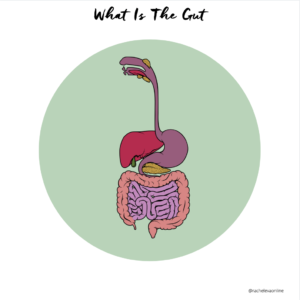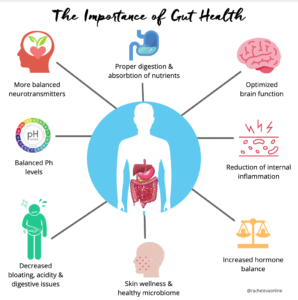Gut Health – Part 1
Understanding Gut Health
by Dr. Rachel Eva Dew, DNM
We have all heard the phrase ‘Trust your gut’. But is following that actually a health practice that is also backed by science? Yes, it sure is!! You may think that your brain has the most nerve endings and receptors, but it doesn’t… your gut does! This means that your gut is responsible for receiving more signals then your brain and is deeply interconnected to the healthy functioning of the entire body, including the brain.
‘According to Dr. Ganjhu, the gut serves as a communication center for the brain, not only to ensure optimal digestion but also other important health functions. “I often refer to the brain as a part of the gastrointestinal system, because the brain and gut are in constant communication,” she said.’ – NYU Division of Gastroenterology Department of Medicine
What does this mean for you and your health? It means that taking intentional steps towards creating the optimal healthy gut is a health and wellbeing game changer!

Let’s dive into WHAT IS YOUR GUT?
Your gut is not just the stomach and intestines as many believe. According to The National Institute of Health ‘The digestive system is made up of the gastrointestinal tract—also called the GI tract or digestive tract—and the liver, pancreas, and gallbladder. The GI tract is a series of hollow organs joined in a long, twisting tube from the mouth to the anus. The hollow organs that make up the GI tract are the mouth, esophagus, stomach, small intestine, large intestine, and anus. The liver, pancreas, and gallbladder are the solid organs of the digestive system’. The entire ‘gut’ is a complex and interconnected system.
Your whole gut is actually made up of the following:
- Mouth & Salivary Glands
- Esophagus
- Digestive System – Stomach, Small intestine, Pancreas, liver, gallbladder
- Colon & Rectum

The Importance of Gut Health –
The health and proper balance of your gut contributes to both health and illness in significant ways. No matter what health issues someone is facing, adding intentionality and effective actions towards increasing gut health will make a positive impact.
Your gut health effects every organ and system in your body, especially the following:
- Your immune system
- The balance of neurotransmitters in your brain
- Your digestion & absorption of nutrients
- Your Ph levels
- Your microbiome (more on this below)
- Brain function
- Internal inflammation (inflammation is associated and present with all illness & disease)
- Mental and emotional health
- Hormones
Begin making healthier choices when it comes to your gut health and stay tuned for Part 2 of this blog series!
In Wellness,
Dr. Rachel

